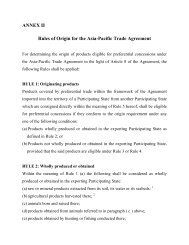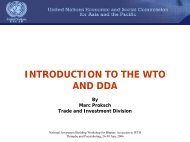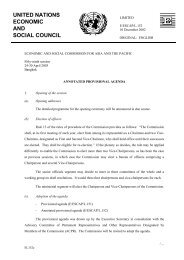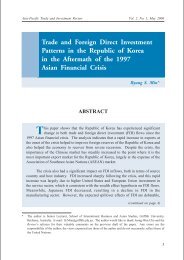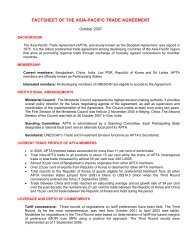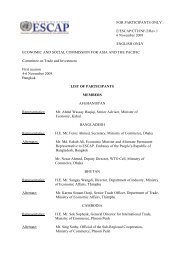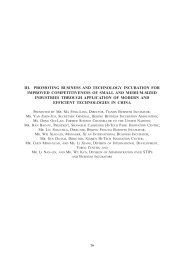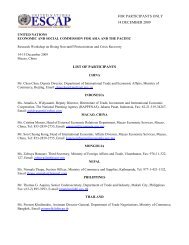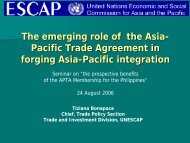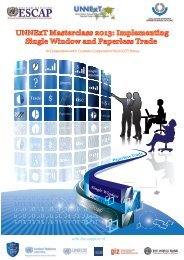country studies on bangladesh, nepal and sri lanka - Escap
country studies on bangladesh, nepal and sri lanka - Escap
country studies on bangladesh, nepal and sri lanka - Escap
You also want an ePaper? Increase the reach of your titles
YUMPU automatically turns print PDFs into web optimized ePapers that Google loves.
STUDIES IN TRADE AND INVESTMENT 70<br />
particularly lawyers, accountants, business c<strong>on</strong>sultants <strong>and</strong> technical c<strong>on</strong>sultants do not<br />
provide cost effective management soluti<strong>on</strong>s required for SMEs. Furthermore, lack of<br />
informati<strong>on</strong> <strong>and</strong> accessibility to utilize existing services by SMEs has also resulted in<br />
weak dem<strong>and</strong> for such facilities. Obtaining informati<strong>on</strong> <strong>on</strong> commercial law, taxati<strong>on</strong>,<br />
customs regulati<strong>on</strong>, market intelligence, business advisory services, training<br />
opportunities <strong>and</strong> financing sources is generally expensive <strong>and</strong> time c<strong>on</strong>suming; thus,<br />
most of the SMEs, particularly in South Asian countries are unable to avail themselves<br />
of those provisi<strong>on</strong>s. It is therefore most desirable that governments should take the<br />
lead in promoting such critical SME development services jointly with business <strong>and</strong><br />
industry associati<strong>on</strong>s. D<strong>on</strong>ors particularly can assist by providing financial assistance<br />
<strong>and</strong> sharing in successful business experience coming from other countries, including<br />
professi<strong>on</strong>al certificate schemes for service providers.<br />
The six key areas for SME development, where d<strong>on</strong>ors’ assistance is provided,<br />
require further strengthening. With active involvement of all stakeholders, particularly<br />
SME associati<strong>on</strong>s, chambers of commerce <strong>and</strong> industry as well as governments soliciting<br />
large d<strong>on</strong>or assistance, a supportive envir<strong>on</strong>ment can be fostered for SME development.<br />
This is particularly important, as the emergence of global value chains poses new<br />
challenges but also provides opportunities for SMEs.<br />
1.3. The emergence of global <strong>and</strong> regi<strong>on</strong>al value chains<br />
8<br />
One significant development in the Asia-Pacific business sector has been the<br />
emergence of global <strong>and</strong> regi<strong>on</strong>al supply or value chains. 3 A global value chain refers<br />
to the full range of cross-border value added business activities, which are required to<br />
bring a product or service from its c<strong>on</strong>cepti<strong>on</strong> through design, sourcing raw materials<br />
<strong>and</strong> intermediate inputs, producti<strong>on</strong>, marketing, distributi<strong>on</strong> <strong>and</strong> support to the final<br />
c<strong>on</strong>sumer (ESCAP 2007). The rise of these global value chains is the result of two<br />
interdependent <strong>and</strong> complementary dynamics: reorganizati<strong>on</strong> <strong>and</strong> relocati<strong>on</strong>. While<br />
the first involves business decisi<strong>on</strong>s about what core competencies the enterprise needs<br />
to retain <strong>and</strong> which functi<strong>on</strong>s it could outsource, the latter <strong>on</strong>e is about offshoring, i.e.<br />
moving the firm’s entire or partial operati<strong>on</strong>s to another <str<strong>on</strong>g>country</str<strong>on</strong>g> (ESCAP 2007).<br />
Furthermore, global value chains have also grown as a result of some key developments,<br />
accompanying the globalizati<strong>on</strong> process, <strong>and</strong> the emergence of internati<strong>on</strong>al<br />
producti<strong>on</strong> networks. Such developments include trade <strong>and</strong> investment liberalizati<strong>on</strong>,<br />
the development of low-cost <strong>and</strong> fast logistics systems <strong>and</strong> ICT applicati<strong>on</strong>s that enable<br />
products <strong>and</strong> services, including semi-processed outputs, to quickly <strong>and</strong> efficiently move<br />
across the world.<br />
3<br />
For further details, see United Nati<strong>on</strong>s, Globalizati<strong>on</strong> of Producti<strong>on</strong> <strong>and</strong> the Competitiveness of<br />
Small <strong>and</strong> Medium-sized Enterprises in Asia <strong>and</strong> the Pacific: Trends <strong>and</strong> Prospects. Sales No.E.09.II.F.23;<br />
United Nati<strong>on</strong>s., Asia-Pacific Trade <strong>and</strong> Investment Report 2009:Trade-led Recovery <strong>and</strong> Bey<strong>on</strong>d.<br />
Sales No.E.09.II.F.19; United Nati<strong>on</strong>s, Linking Greater Mek<strong>on</strong>g Subregi<strong>on</strong> Enterprises to Internati<strong>on</strong>al<br />
Markets: The Role of Global Value Chains, Internati<strong>on</strong>al Producti<strong>on</strong> Networks <strong>and</strong> Enterprise Clusters,<br />
Sales No.E.07.II.F.2.



